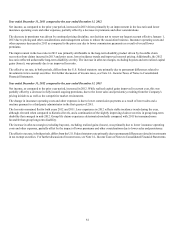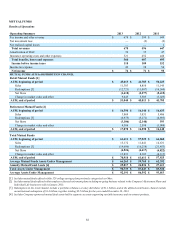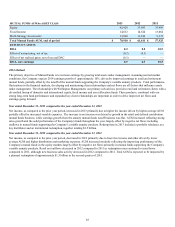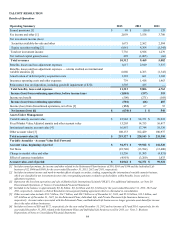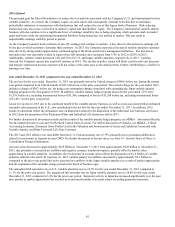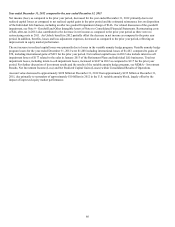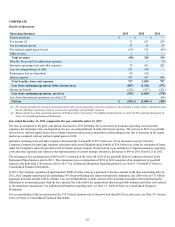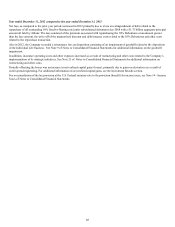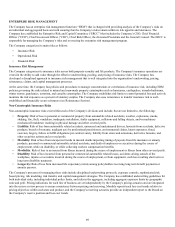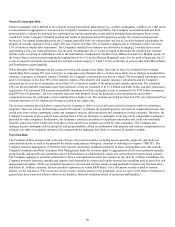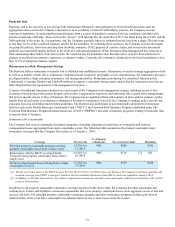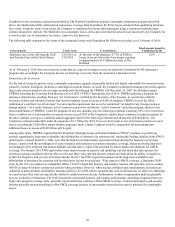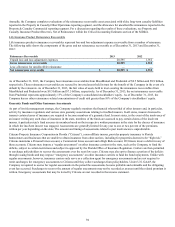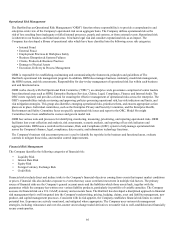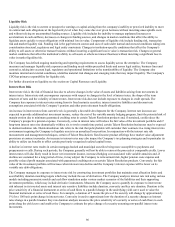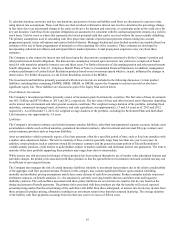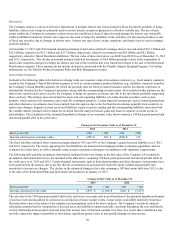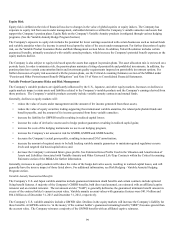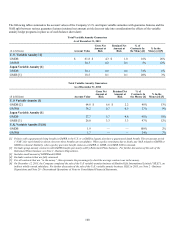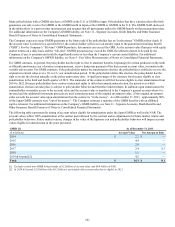The Hartford 2013 Annual Report Download - page 91
Download and view the complete annual report
Please find page 91 of the 2013 The Hartford annual report below. You can navigate through the pages in the report by either clicking on the pages listed below, or by using the keyword search tool below to find specific information within the annual report.
91
Pandemic Risk
Pandemic risk is the exposure to loss arising from widespread influenza or other pathogens or bacterial infections that create an
aggregation of loss across the Company's insurance or asset portfolios. Consistent with industry practice, the Company assesses
exposure to pandemics by analyzing the potential impact from a variety of pandemic scenarios based on conditions consistent with
historical outbreaks of flu-like viruses such as the “Severe” 1918 Spanish Flu, the Asian flu of 1957, the Hong Kong flu of 1968, and the
2009 outbreak of the swine flu. For pandemic risk, the Company generally limits its estimated pre-tax loss from a single 250 year event
to less than 12.5% of the combined statutory surplus for the enterprise. In evaluating these scenarios, the Company assesses the impact
on group life policies, short-term and long term disability, annuities, COLI, property & casualty claims, and losses in the investment
portfolio associated with market declines in the event of a widespread pandemic. While Enterprise Risk Management has a process to
track and manage these limits, from time to time, the estimated loss for pandemics may fluctuate above or below these limits due to
changes in modeled loss estimates, exposures, or statutory surplus. Currently, the Company's estimated pre-tax loss for pandemic is less
than 12.5% of enterprise statutory surplus.
Reinsurance as a Risk Management Strategy
The Hartford utilizes reinsurance to transfer risk to affiliated and unaffiliated insurers. Reinsurance is used to manage aggregation of risk
as well as to transfer certain risk to reinsurance companies based on specific geographic or risk concentrations. All reinsurance processes
are aligned under a single enterprise reinsurance risk management policy. Reinsurance purchasing is a centralized function across
Commercial, Consumer Markets and Talcott Resolution to support a consistent strategy and to ensure that the reinsurance activities are
fully integrated into the organization's risk management processes.
A variety of traditional reinsurance products are used as part of the Company's risk management strategy, including excess of loss
occurrence-based products that protect property and workers compensation exposures, and individual risk or quota share arrangements,
that protect specific classes or lines of business. The Company has no significant finite risk contracts in place and the statutory surplus
benefit from all such prior year contracts is immaterial. Facultative reinsurance is used by the Company to manage policy-specific risk
exposures based on established underwriting guidelines. The Hartford also participates in governmentally administered reinsurance
facilities such as the Florida Hurricane Catastrophe Fund (“FHCF”), the Terrorism Risk Insurance Program established under The
Terrorism Risk Insurance Program Reauthorization Act of 2007 (“TRIPRA”) and other reinsurance programs relating to particular risks
or specific lines of business.
Reinsurance for Catastrophes
The Company has several catastrophe reinsurance programs, including reinsurance treaties that cover property and workers’
compensation losses aggregating from single catastrophe events. The following table summarizes the primary catastrophe treaty
reinsurance coverages that the Company has in place as of January 1, 2014:
Coverage Treaty term % of layer(s)
reinsurance Per occurrence limit Retention
Principal property catastrophe program covering
property catastrophe losses from a single event 1/1/2014 to
1/1/2015 90% $850 $350
Reinsurance with the FHCF covering Florida
Personal Lines property catastrophe losses from a
single event
6/1/2013 to
6/1/2014 90% $119 [1] $43
Workers compensation losses arising from a single
catastrophe event [2] 7/1/2013 to
7/1/2014 80% $350 $100
[1] The per occurrence limit on the FHCF treaty is $119 for the 6/1/2013 to 6/1/2014 treaty year based on the Company's election to purchase the
required coverage from FHCF. Coverage is based on the best available information from FHCF, which was updated in January 2014.
[2] In addition, to the limit shown above, the workers compensation reinsurance includes a non-catastrophe, industrial accident layer, 80% of $30
excess a $20 retention.
In addition to the property catastrophe reinsurance coverage described in the above table, the Company has other catastrophe and
working layer treaties and facultative reinsurance agreements that cover property catastrophe losses on an aggregate excess of loss and
on a per risk basis. The principal property catastrophe reinsurance program and other reinsurance programs include a provision to
reinstate limits in the event that a catastrophe loss exhausts limits on one or more layers under the treaties.


